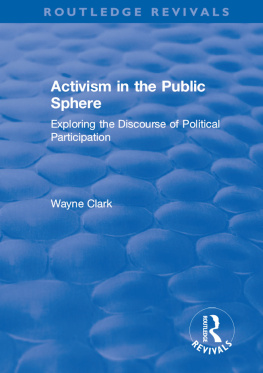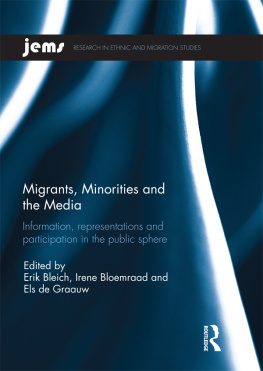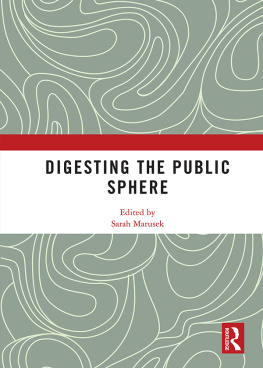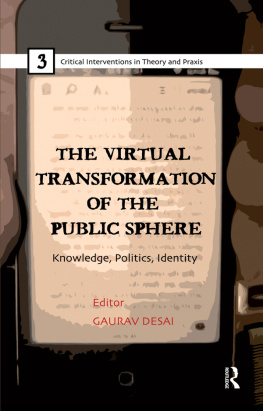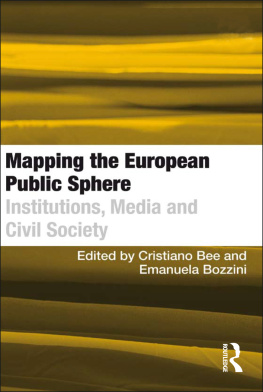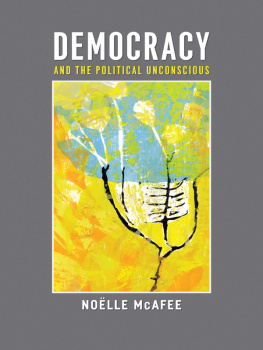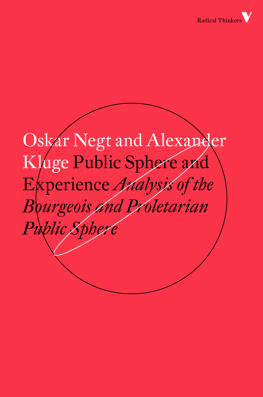ACTIVISM IN THE PUBLIC SPHERE
Activism in the Public Sphere
Exploring the discourse of political participation
WAYNE CLARK
Department of Human Sciences
Buckinghamshire Chilterns University College
First published 2000 by Ashgate Publishing
Reissued 2018 by Routledge
2 Park Square, Milton Park, Abingdon, Oxon OX14 4RN
711 Third Avenue, New York, NY 10017, USA
Routledge is an imprint of the Taylor & Francis Group, an informa business
Copyright Wayne Clark 2000
All rights reserved. No part of this book may be reprinted or reproduced or utilised in any form or by any electronic, mechanical, or other means, now known or hereafter invented, including photocopying and recording, or in any information storage or retrieval system, without permission in writing from the publishers.
Notice:
Product or corporate names may be trademarks or registered trademarks, and are used only for identification and explanation without intent to infringe.
Publishers Note
The publisher has gone to great lengths to ensure the quality of this reprint but points out that some imperfections in the original copies may be apparent.
Disclaimer
The publisher has made every effort to trace copyright holders and welcomes correspondence from those they have been unable to contact.
A Library of Congress record exists under LC control number: 00109572
ISBN 13: 978-1-138-72867-7 (hbk)
ISBN 13: 978-1-315-19042-6 (ebk)
Contents
There are a number of people I would like to take the opportunity to thank. First and foremost, I must express gratitude to my doctoral supervisors at the University of Luton for their constant support and advice during the past three years: Dr Usman Khan and Dr Peter McLaverty. I would also like to extend acknowledgement to Professor Michael Rustin for his frequent and valuable insights. Without the advice of my supervisors, I may well have overlooked important theoretical and practical questions. I would also like to thank all members of the Labour Party, Amnesty International, the Exodus collective and various Tenants and Residents Associations to whom I have spoken during the course of this research. Your time and patience has been highly appreciated, and without your contribution this research would not have been possible. In addition, I would like to extend special thanks to the Communications Department of Amnesty International UK for contributing to the smooth progress of my interviews with members of Amnesty International. Acknowledgement must also be given to the various local Constituency Party workers within the Labour Party who have taken part in this research, but have preferred to remain anonymous. Finally, I would like to express my gratitude to my parents and brother. Without their continued support and enthusiasm this book would never have been completed.
The politically active citizen provides a compelling symbol of democracy in action. Potent images such as the urban unrest inspired by the global anti-capitalist protests of 1999 or the continuing direct action against genetically modified food in Britain serve to remind us of the power of the politically motivated citizen. Underlying these images is a long-standing commitment amongst theorists of radical democracy to the potential role that involvement in political life can play in developing a stronger sense of citizenship and consequently a more politically vocal public. The direct involvement of citizens in political life is invariably seen as a fundamental part of a democratic polity.
Yet, in liberal democracies such as Britain, political involvement is a multi-faceted phenomenon with many disparate forms. Not all examples of political activism will necessarily represent a challenge to state power or global multinational exploitation, for example. Similarly, one cannot necessarily assume that all forms of citizen action will occur outside of state structures. Indeed, local state initiatives designed to encourage greater involvement amongst the public are a fundamental part of contemporary policy debates within British local government. It is also important to be aware of the changing nature of political participation. For instance, the proliferation of social movements during the 1970s and 1980s has recently been supplemented by the advent of so-called do-it-yourself or direct action politics epitomised by groups such as Reclaim the Streets. At the same time, we have witnessed the rise of large-scale campaigning groups such as Amnesty International and Greenpeace which, in many respects, represent a challenge to the position of established vehicles of political action such as political parties. However, in the rush to identify new forms of political activism, we should perhaps be wary of overlooking those seemingly mundane forms of political activity that occur on a daily basis within well-established political forums. It would also be nave to ignore the fact that involvement in political and public affairs remains a minority pursuit in Western liberal democracies. The vast majority of people tend to have little or no direct contact with political bodies, and it is only a committed few who undertake regular and sustained participation in the political sphere.
With these comments in mind, the question arises of whether it is still possible to talk of a generic form of political activism that is underpinned by democratic ideals. Indeed, one might pose the question of what exactly is meant by the term active? And how significant are contemporary forms of voluntary political activism within processes of democratisation and political deliberation? This book aims to explore these themes by examining the ways in which citizens of varying levels of political activity understand and interpret their own political action. Drawing upon fieldwork conducted within several political organisations, the book examines the nature of contemporary political participation through the development of a typology of activism. Furthermore, the book aims to critically analyse the deliberative role played by those forms of activism to be found within the political spaces of civil society. The data presented in this book was collected within a spectrum of institutions, each of which has a specific organisational and membership structure. They are made up of the British Labour Party, the British section of Amnesty International, two Tenants Associations, one Residents Association and a radical collective known as Exodus. However, before turning to a more detailed discussion of the aims of the book I will consider exactly what is meant by the term political participation.
Defining Political Participation
The realm of political participation connects citizens with the democratic process. This book will seek to examine this relationship in detail, and to ascertain how and why citizens engage with political life. But what exactly do we mean by political participation? It is a term that embodies a vast range of diverse activities, and a watertight definition therefore often remains elusive. Nonetheless, Parry et al (1992, p. 16) have sought to define the term as taking part in the processes of formulation, passage and implementation of public policies. For analytical purposes, it is thus possible to view participation as a form of activity that involves citizens undertaking some level of involvement in political life beyond the basic act of voting. Although it would be nave to understate the role of electoral voting as the most basic unit of participation, there is growing interest amongst political scientists in those forms of participation that take place beyond the ballot box. The political participation of citizens therefore represents a layer of activity that supplements the established representative political mechanisms associated with liberal democracy.


